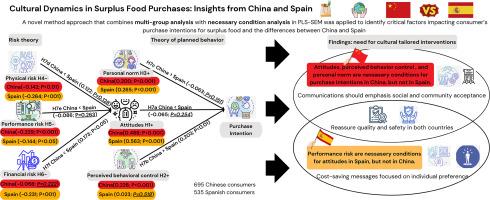From risk to action: how perceived risks and cultural dynamics drive surplus food purchases in China and Spain
IF 10.9
1区 环境科学与生态学
Q1 ENGINEERING, ENVIRONMENTAL
引用次数: 0
Abstract
Surplus food retailing reduces waste and supports food security; however, cultural differences critically shape consumer behaviors. Combining the theory of planned behavior and risk theory, this study compares the drivers and barriers of purchase intentions for surplus food in China (n = 695) and Spain (n = 535) using multi-group analysis combined with necessary condition analysis. The results highlight that Chinese consumers’ intentions rely on perceived behavioral control (enabled by e-commerce and policies), personal norms and attitudes, whereas Spanish intentions hinge on physical, performance, and financial risk perceptions, with no significant behavioral control effects. The findings challenge one-size-fits-all approaches to food waste reduction, proposing an actionable framework in which China prioritizes digital infrastructure and norm-based campaigns, while Spain targets risk-transparent labeling and trust building. This study advances resource-efficient food systems by prioritizing contextual drivers, offering policymakers a roadmap for aligning surplus food strategies with the United Nations Sustainable Development Goals.

从风险到行动:感知风险和文化动态如何推动中国和西班牙的剩余粮食采购
剩余食品零售减少浪费,支持粮食安全;然而,文化差异在很大程度上塑造了消费者的行为。本研究结合计划行为理论和风险理论,采用多群体分析和必要条件分析相结合的方法,比较了中国(n = 695)和西班牙(n = 535)两国剩余食品购买意愿的驱动因素和障碍。结果表明,中国消费者的意愿依赖于感知行为控制(由电子商务和政策实现)、个人规范和态度,而西班牙消费者的意愿依赖于对身体、绩效和财务风险的感知,没有显著的行为控制效果。研究结果对减少食物浪费的一刀切方法提出了挑战,提出了一个可操作的框架,其中中国优先考虑数字基础设施和基于规范的运动,而西班牙则以风险透明标签和信任建立为目标。本研究通过优先考虑环境驱动因素来推进资源节约型粮食系统,为政策制定者提供使剩余粮食战略与联合国可持续发展目标保持一致的路线图。
本文章由计算机程序翻译,如有差异,请以英文原文为准。
求助全文
约1分钟内获得全文
求助全文
来源期刊

Resources Conservation and Recycling
环境科学-工程:环境
CiteScore
22.90
自引率
6.10%
发文量
625
审稿时长
23 days
期刊介绍:
The journal Resources, Conservation & Recycling welcomes contributions from research, which consider sustainable management and conservation of resources. The journal prioritizes understanding the transformation processes crucial for transitioning toward more sustainable production and consumption systems. It highlights technological, economic, institutional, and policy aspects related to specific resource management practices such as conservation, recycling, and resource substitution, as well as broader strategies like improving resource productivity and restructuring production and consumption patterns.
Contributions may address regional, national, or international scales and can range from individual resources or technologies to entire sectors or systems. Authors are encouraged to explore scientific and methodological issues alongside practical, environmental, and economic implications. However, manuscripts focusing solely on laboratory experiments without discussing their broader implications will not be considered for publication in the journal.
 求助内容:
求助内容: 应助结果提醒方式:
应助结果提醒方式:


